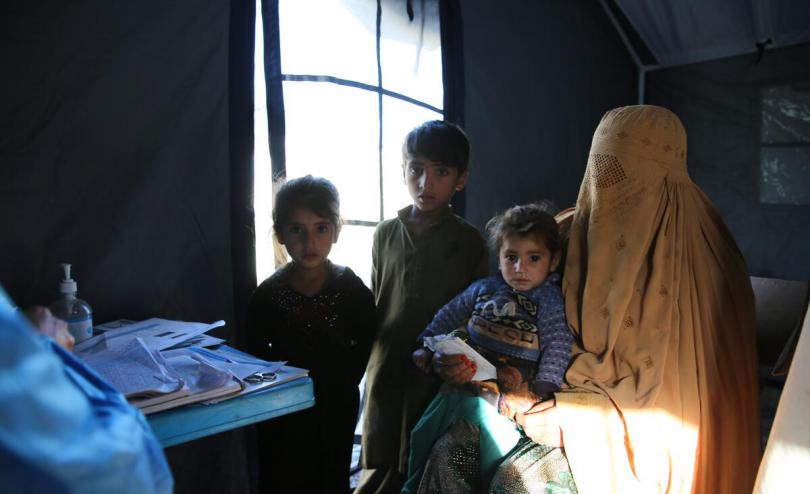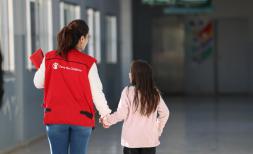Afghanistan: 250,000 children in need of food, homes and education after returning from Pakistan

Asra*, 30, and her children at a Save the Children health clinic. Photo by Fahim Mayar/Save the Children. More content available here
Content available here
KABUL, 18 April 2024 - Nearly a quarter of a million Afghan children need proper homes, food, and access to education after returning from Pakistan in the past seven months with virtually nothing, said Save the Children.
More than 520,000 Afghans have returned from Pakistan since September 2023 after Pakistan said all undocumented foreigners must leave the country voluntarily or face deportation. Nearly half of all the returnees are children [1].
A survey by Save the Children of families who have returned to Afghanistan - and the communities who are hosting them - found that nearly all (99%) do not have enough food for the next one to two months. About three-quarters of returnees and families in host communities reduced portion sizes or restricted the food consumption of adults so small children could eat on at least two days in the previous week.
About 40% of returnees and host families surveyed had to borrow food or rely on friends and relatives for at least three days a week – with 13% of returnees and 9% of host families saying they had to get food from others every day.
Almost 8 million children in Afghanistan – or one in three – are facing crisis levels of hunger [2].
Nearly one in six families live in tents, according to the survey, with most returnees having little or no means to support themselves. Only a third had managed to bring assets back with them from Pakistan. Nearly half (47%) said there were no jobs available in Afghanistan, with 81% saying that they do not have any skills that could lead to employment.
Almost two thirds (65%) of children who have returned to Afghanistan have not been enrolled in school. The majority (85%) told Save the Children that they don’t have the necessary documents to register and enroll in school. In Pakistan, more than two thirds of these children had been attending school.
Raihana* (15) is living with her grandfather after returning with her mother and 3 siblings. The family sold everything before they left Pakistan.
She said: “When I was returning to Afghanistan, I bid farewell to my friends there. They were very sad about it, and I am sad too. I will not be able to meet them again until we can go with proper documents to Pakistan, which is not easy for us.
“We are in desperate need of aid. We need shelter, living essentials, winter clothing, shoes, blankets, food and medicine. Afghanistan is very cold for us, and it is challenging because we do not have winter clothing. My sister and brother became ill, so we brought them here to see the doctors."
Save the Children is operating five mobile health and nutrition clinics in areas close to Torkham and Spin Boldak and also have health teams operating in Nangarhar to support returnees and their host communities. It is also providing child protection, psychosocial support and water, sanitation and hygiene services in camps and reception centres as well as providing cash assistance to 2,500 families who have returned from Pakistan.
Arshad Malik, Country Director for Save the Children in Afghanistan, said:
“Families are returning to Afghanistan with virtually nothing. Most are relying on relatives or friends to support them – and these communities already have little to support themselves. The return of so many people is creating an additional strain on already overstretched resources. Children need support and stability. Many undocumented Afghan children were born in Pakistan - Afghanistan is not the place they call home.
“Afghanistan is struggling to cope with the pressure of displacement. In addition to the returns from Pakistan, 600,000 Afghans arrived from Iran last year [3]. Families have been forced from their homes by multiple disasters, including the series of earthquakes in Herat and the ongoing drought. Afghanistan is also now home to the second largest number of internally displaced people in the world – or roughly 1 in 7 people [4].
“Pakistan has generously hosted large numbers of Afghan refugees for many decades. We hope that this demonstration of compassion and solidarity will continue for those vulnerable families who still need international protection.
“Afghanistan not only needs urgent funding from international donors and governments - we also need long term, community-based solutions to help all displaced Afghans rebuild their lives.”
ENDS
Notes to editors
485 returnee households and 240 households in host communities in Nangarhar, Kunar and Laghman were surveyed by Save the Children. A survey questionnaire and key informant interviews were used for the primary data collection in November 2023.
* denotes name changed to protect identity
You can read the report here
Multimedia content: http://www.contenthubsavethechildren.org/Package/2O4C2SOWU9B4
Save the Children has been supporting communities and protecting children's rights across Afghanistan since 1976, including during periods of conflict and natural disasters. We have programmes in nine provinces and work with partners in an additional seven provinces. Since August 2021, we've been scaling up our response to support the increasing number of children in need. We deliver health, nutrition, education, child protection, shelter, water, sanitation and hygiene, and livelihood support.
Sources
[3] https://www.acaps.org/en/countries/iran
We have spokespeople available.
For interview requests and further information, please contact:
Rachel Thompson, Asia Pacific Regional Media Manager, rachel.thompson@savethechildren.org
Emily Wight, Global Media Manager, Emily.Wight@savethechildren.org;
Our media out of hours (BST) contact is media@savethechildren.org.uk / +44(0)7831 650409
Please also check our Twitter account @Save_GlobalNews for news alerts, quotes, statements, and location Vlogs.




